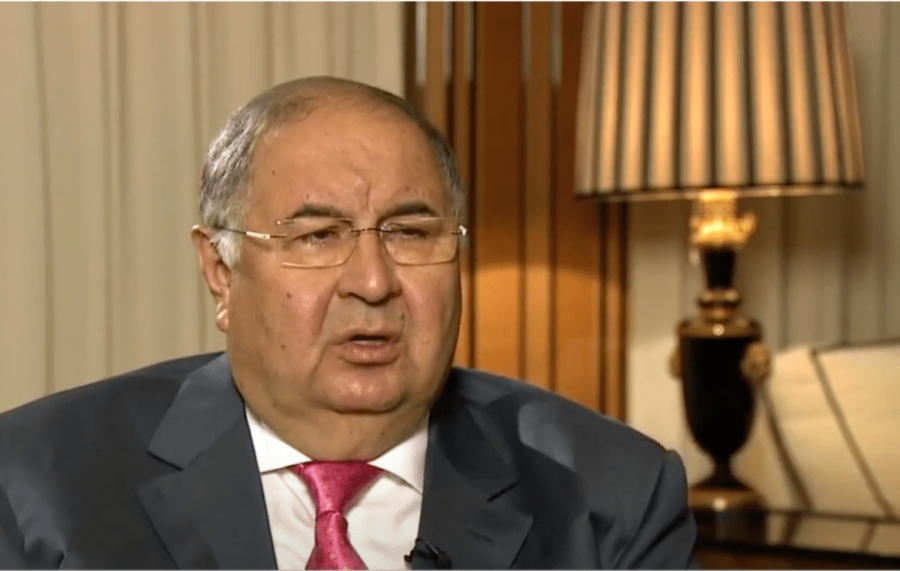The Uzbek-Russian billionaire Alisher Usmanov, slapped with EU sanctions two years ago, has pursued a step-by-step strategy of challenging the reasoning under which he and his relatives were penalized. This strategy has come with success for Usmanov and at a public cost for European institutions.
Among politicians and media in Brussels and other EU capitals, there is growing concern over the integrity of the evidence that was used to sanction Russian elites in the wake of the war in Ukraine.
In the past weeks, lawyers representing Alisher Usmanov and his sister Gulbakhor Ismailova, also sanctioned by the EU over ties to her brother, have struck down key public claims about property ownership and connections with the Russian government that apparently formed the basis for imposing EU sanctions against the billionaire and his family.
The move followed a series of earlier court decisions that raised questions about the reasoning behind EU sanctions against the billionaire and his sister.
According to EU Today’s sources, the economist recently removed the post after being approached by Usmanov’s lawyers and agreed out-of-court to refrain from disseminating information which the billionaire’s defense says is defamatory.
A deleted post from Anders Åslund accessed via the Wayback Machine.
The billionaire has been contesting the EU restrictions as “unfounded” in court.
In other words, sanctions can be based on media reports that subsequently do not hold up in court. The result: a deadlock.
This claim, which Forbes attributed to an unnamed expert, appeared almost verbatim in the European Council’s justification for imposing sanctions against Usmanov.
The court banned the magazine from further disseminating these statements.
The EU has been criticised for relying on hastily compiled evidence from questionable sources to adopt its Russia-related sanctions, according to a report from Politico.
Sources have included anonymous blogs and social media posts, as well as articles that were apparently written by artificial intelligence.
As EU Today noted earlier, the ruling against Forbes could set a legal precedent for challenging the sources that the EU relied on to justify individual sanctions imposed over the war in Ukraine.
The deletion of Åslund’s post may further erode the EU sanctions evidence against Usmanov, his lawyers say.
The Forbes case was not Usmanov’s first legal victory against media claims of his close ties to the Kremlin.
As reported by the German news outlet BILD, another potential setback to EU sanctions came this week when Germany’s Federal Criminal Police Office (the Bundeskriminalamt, or BKA) quietly deleted a series of two posts on X that named Usmanov’s sister Gulbakhor Ismailova as the ultimate owner of assets tied to the billionaire – namely the Dilbar mega-yacht, valued at a reported half-billion euros.
The EU imposed sanctions against Ismailova in April 2022 on the basis of her alleged ownership of the yacht and other properties in Europe.
These texts – as well as the EU sanctions reasoning, which expressly relies on BKA investigations – suggest that the BKA’s conclusions may have triggered EU sanctions against Ismailova.
Ismailova’s representatives have maintained that the yacht and other assets belong to irrevocable trusts established by Usmanov years ago, but of which he is not a beneficiary.
Ismailova also forfeited beneficiary rights in the trusts after being hit with EU sanctions and has since asked the trustees to consider excluding her from such rights in the future, even if restrictions against her are lifted.
According to her lawyers, the Deutsche Bundesbank issued a decision last fall concluding that neither Usmanov nor Ismailova could be considered to own or control the assets in Germany in question.
Since 2022, Usmanov’s lawyers have secured pledges from a number of European media outlets and public figures to cease the unlawful dissemination of inaccurate information about the billionaire after the latter were unable to prove their allegations.
Other media outlets have voluntarily corrected or removed their articles after receiving letters from Usmanov’s representatives about inaccurate claims contained in the texts.
Most of these were related to unproven claims that Usmanov owned real estate in Germany, which were later echoed in the rationale for Ismailova’s listing.
As the evidence underpinning sanctions looks increasingly weak, it remains to be seen whether the European legal system will meet its commitment to upholding justice, rather than maintaining sanctions at any cost.
So far, the EU approach shows that politics are winning out over the rule of law.
In the end, it’s the integrity of the European justice system that may suffer the most damage as a result of sanctions that are poorly evidenced and doggedly pursued.
——————————————————————————————————–

Read also: Alisher Usmanov: German court rules in favour of Russian billionaire after “unlawful” search warrants
——————————————————————————————————–

Follow EU Today on social media:
Twitter: @EU_today
@EU_sports
Facebook: https://www.facebook.com/EUtoday.net/
https://www.facebook.com/groups/968799359934046
YouTube: https://www.youtube.com/@eutoday1049












